#Virginia Resolution of 1798
Text
States of the United States vs. the Federal Government
States of the United States vs. the Federal Government: http://wp.me/prazu-12S
From before the adoption of the US Constitution in 1787, there has been strenuous argument, sometimes bordering on the violent, between those who wanted a strong central government and those who saw the individual states as the primary locus of governmental power—except for those 18 specific powers granted to the two houses of the federal government, as enumerated in the Constitution.
(Former…
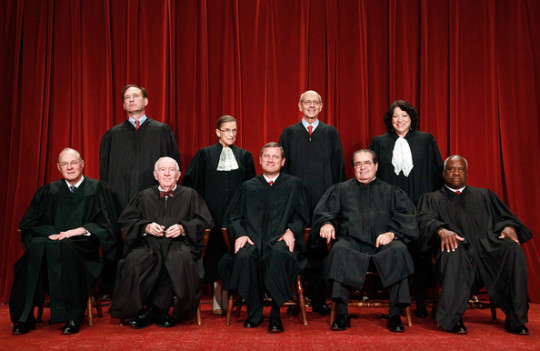
View On WordPress
#Alien and Sedition Acts#Articles of Confederation#Continental Congress#enumerated powers#Kentucky Resolution of 1799#Ninth Amendment to the US Constitution#nullification of federal statutes#Tenth Amendment to the US Constitution#The Articles of Confederation and Perpetual Union Between The States#The Federalist Papers#Virginia Resolution of 1798
0 notes
Note
Du hast darum gebeten, also liefere ich:
Brauche erstmal ein bisschen Grundwissen, deshalb: Ist irgendetwas in der noch ganz frischen USA passiert, was du ganz wild findest? Ich war auch mal kurze Zeit total in US-amerikanische Geschichte interessiert, hab mich aber eher so im 1770er-80er Bereich aufgehalten, und die Anekdoten da waren zahlreich, kann mir gut vorstellen, dass das die Jahrzehnte danach auch noch so war
Als junge Nation, die gerade erst eine Verfassung gekriegt hatte, war in Amerika verdammt viel los. Vor allem der Kampf zwischen den Demokraten-Republikanern um Jefferson, die eine kleine Regierung wollten, und den Föderalisten um Hamilton, die eine starke Regierung wollten.
Als 1798 ein unerklärter Krieg mit Frankreich ausbrach, haben die Föd. es einfach verboten, gegen die Regierung zu sein, genauer Lügen und Verrat zu verbreiten. Sogar ein Abgeordneter und der Redakteur des wichtigsten Oppositionsblattes kamen dafür hinter Gittern!
Jefferson und sein Freund Madison (ja, überraschenderweise im Gegensatz zum passionierten, pansexuellen, charismatischen Hamilton (echtes Zitat von nem Historiker) und seinem Laurens oder Friedrich "auf Sanssouci werden nicht nur Flöten geblasen" II. Der Große von Preußen wohl nicht gay. Madison liebte tatsächlich seine etwa 10 Centimeter größere Frau Dolly sehr, es war eine verdammt süße Beziehung) fanden dies schlecht. Sie überzeugten also die Bundesstaaten Kentucky und Virginia zwei Beschlüsse zu verabschieden, kurz gesagt zwei Mittelfinger nach Washington. Jeffersons Kentucky Resolution war recht radikal, die Staaten sollten das Gesetz nullifizieren. Madison, der nur eine Allianz der Bundesstaaten vor Augen hatte, um die Regierung zu entfernen, entschuldigte seinen Freund; ein Genie formuliere seine Gedanken im Eifer des Gefechts halt immer ein wenig extremer. An sich waren die Resolutions ein ziemlicher Flop, zwei Jahre später gewinnen sie die Wahl doch.
32 Jahre vorspulen, die meisten Gründerväter sind tot. John C. Calhoun will ein Gesetz der Bundesregierung eigenständig als Bundesstaat abschaffen. Irgendwas mit Zöllen um die Industrie zu fördern (Es ging ihm um Sklaverei es geht den Südstaatlern immer nur um Sklaverei). Er begründet sich mit den Kentucky and Virginia Resolutions und Präsident Jackson interpretiert es als Landesverrat - immerhin drohte Calhoun mit einer Unabhängigkeitserklärung - und beruft die Armee.
Doch was ist das? Es ist Madison, der letzte der Gründerväter, mit einem Stahlstuhl! Er sagt Calhoun fick dich ins Knie, du missinterpretierst mich! Mir ging es nur um den Schutz der Bürgerrechte, nicht um fieeeeessssseeeeee Steuern! Außerdem wollte ich nie Verrat, ich wollte die Bundesstaaten in Opposition zur Regierung versammeln! Wie reagiert Calhoun? Er nennt ihn einen senilen Heuchler. Daran erkennt man die wahre Beziehung der Amerikaner zu ihren Gründervätern sehr gut: Wenn es politisches Kapital bringt, da zitiert man die Gründerväter gerne. Aber wenn sie deiner Meinung widersprechen, dann können sie dich mal.
Am Ende gab Calhoun klein bei und die Zölle wurden etwas gesenkt.
Eine weitere Anekdote handelt von zwei Provinzpolitikern aus den 1830ern, die wohl sehr gute Freunde und Roommates waren. Der eine schrieb nämlich, wie sehr er es vermisse mit dem anderen in einem Bett zu schlafen ... manchmal glaube er im Traum, seinen "Woody" zu ergreifen, in Wahrheit sei es aber nur eine Bettkante...
Ansonsten muss ich dich ein wenig enttäuschen, die Gründerväter hatten zwar richtig lustige petty Fights, es ging halt aber einfach meist um solche Themen wie: Darf die Regierung Straßen bauen? Sollte manuelle erheben, um die Industrie zu fördern? Und ein paar Jahre später geht's dann um die Sklaverei, und die ist nicht mehr lustig.
3 notes
·
View notes
Text
“I confess that it seems to me exceedingly clear, that our Constitution is most worthless and tyrannical, if the usurpations of those who administer it, cannot be resisted by any means short of revolution. I have always considered the reserved powers of the Federal Government; and I have always considered it, not only the right, but the imperious duty of the States, so to apply that check, as not to dissolve the Union.”
-Abel Upshur, Nullification: An Exposition of the Virginia Resolutions of 1798
0 notes
Text
In the Virginia Resolutions of 1798, Madison wrote that “in case of a deliberate, palpable, and dangerous exercise” of power by the federal government, states “have the right, and are in duty bound, to interpose for arresting the progress of the evil.”
#in duty bound#james madison#government tyranny#states rights#federal government#virginia resolutions of 1798
2 notes
·
View notes
Text
Battles of Mackinac Island (1812) & (1814): Fights for control of the Old Northwest of America and Great Lakes during the War of 1812.
The War of 1812 (1812-1815) between the US and UK is sometimes cited as a “forgotten” war. However, that would be an inaccurate description and depends on the participants you ask. Remembered in the United States as a “Second War of Independence” it was treated as sort of a victory due to the lack of territorial change and the major victories such as the Battles of Lake Erie, Baltimore, Plattsburgh and New Orleans. In Canada, at the time a British colony, its remembered for its role in forging an Canadian national identity and the repelling of repeated American invasions. In Britain, its little remembered other than as a sideshow for the Napoleonic Wars. Meanwhile, for the Native American tribes that fought on the side of the British its largely remembered as a devastating loss that lead to permanent displacement and the consolidation of American expansion east of the Mississippi River. The war was in fact a military and political stalemate and had multiple causes and was fought by participants who were ill prepared for the management of executing a war at that time and was marked by repeated blunders and tended to favor a defensive over offensive strategy between both sides.
Background:
-1781 with the American victory at the Battle of Yorktown in Virginia saw an end to major combat in the American Revolution. 1783 saw Britain finally recognize America’s independence. Anticipating America as a major commercial trading partner. It sought to offer generous and lenient terms to the 1783 Treaty of Paris which included granting the US all territory east of the Mississippi River and south of the Great Lakes, an area sparsely populated by Europeans at the time and held a variety of many Native American tribes. This territory was considered the Northwest of the United States at the time and from 1787-1803 was referred to the as the (US) Northwest Territory and encompassed all of the modern US states of Ohio, Michigan, Indiana, Illinois & Wisconsin.
-The area was important to the Europeans and later European Americans for its role in the fur trade Great Lakes fishing and geopolitical control over North American continent.
-Following the 1780′s until the time of the War of 1812, American settlement in the area grew but remained sparse and relegated to a few scattered settlements with Native American tribes sometimes friendly and sometimes hostile to the United States residing alongside the new settlers. The fur trade remained dominant in terms of economic interest. The British also maintained a military presence in the area despite the Treaty of Paris handing over the territory to the Americans.
-Tensions with the British backed Native Americans and European American settlers boiled over into the Northwest Indian War (1785-1795) which resulted in an US victory at the 1794 Battle of Fallen Timbers. American settlement into Ohio Country was ascertained after this point and the British withdrew their minimal forces in the area (Ohio). Though tensions remained, due in part to some British presence remaining in the sparsely settled Northwest.
-The other major development of the 1790′s and onward was the French Revolution and later Napoleonic Wars of the early 19th century which grew out of that. The United States had to determine its course of action relative to the greater European conflict between France and the various older monarchies they fought, namely Britain.
-Under President George Washington, the US adopted a stance of neutrality that sought trade with both Britain and France. The Jay Treaty he had signed with Britain was very controversial but Washington saw economic prosperity for America rather than war as its ultimate goal. Neither France nor Britain responded well to neutral American trade with its rival. The French Republic and the US fought a limited low level conflict called the Quasi War (1798-1800) which ultimately ended in no victory for either side and the old Franco-American alliance of the Revolutionary period gave way to a new one based more on free-trade. Coupled with the Louisiana Purchase of 1803 which expanded American owned territory to the Trans-Mississippi, the British saw these developments as undesirable.
-From 1792-1815 aside from a previous 14 month peace Britain and France remained at war. For the most part Britain dominated the seas with the Royal Navy while France under Napoleon Bonaparte dominated the European continent. Britain maintained blockades of France as well as providing mostly subsidies to its Continental partners in Austria, Prussia, Russia and others rather than provide many ground troops since Britain possessed a small but professional army.
-Only after Napoleon’s invasion of Portugal and subsequent betrayal and conquest of Spanish ally did Britain provide a large long term ground troop presence on the continent, fighting in the Iberian theater’s Peninsular War (1807-1814).
-During the course of these events America’s merchant fleet doubled and became the world’s largest neutral merchant fleet. This caused resentment in Britain who felt it might be eclipsed by the US eventually in terms of trade.
-The US was not untested during this time having fought the First Barbary War against Tripoli (Libya) by using a naval bombardment combined with a US Marine and Arab-Greek mercenary force to defeat the Barbary pirates at the Battle of Derna. A treaty was signed freeing all American sailors taken as prisoner and made slaves by the Muslim pirates of Tripoli. The war demonstrated American power projection overseas for the first time and was noted by the European powers of the day.
-However, the French rivalry with Britain drove most events in and around America’s relations with Europe and the practice of impressment by both the French and British navies caused real ire in the US. Impressment was the force pressing into service of sailors to work aboard British or French ships and it included the stopping and seizure of neutral American military and merchant vessels and their crews. The British practiced it more than the French and Britain argued that any trade that benefitted France in war time was not to be permitted. This angered the American government and public at large.
-Additionally, Britain argued they were looking for either runaway British subjects on the ship or refused to recognize British citizenship being renounced in favor of American citizenship and in their eyes were simply fulfilling Admiral Horatio Nelson’s famous quip “England expects that every man will do his duty.”
-America saw this as a clear violation and illegal of the rights of neutral nations. President Thomas Jefferson responded with the Embargo Act to in his mind hurt European trade to the point they would ease up on America and cease impressment. It did not work and in the end hurt American trade more.
-By 1812, under President James Madison, the push for war in the US reached fever pitch in some quarters (outside of New England). The US could no longer stand for British impressment which included taking Americans who were never British subjects along with the continued British support for Native American aggression in the Northwest territory now known as the Michigan & Indiana Territories. Britain had promised to sponsor a Native American buffer state in these territories in the event of a successful war with America. They would also provide weapons, men and goods to support this effort as they had in the past. To answer this support was Tecumseh’s Confederacy, a mix of Native American tribes under the leadership of a Shawnee leader named Tecumseh.
1812: War is declared and the Capture of Fort Mackinac.
-In June 1812, the US declared war and indeed war might have been avoided on Britain’s side had their Prime Minister Spencer Perceval not been assassinated at the same time in May 1812. Perceval had hoped for a diplomatic resolution to tensions with America, knowing Britain could ill afford war in the Americas.
-America declared war but had a small regular army due to a longstanding reliance on the militia system which had existed since colonial times in the 17th century. Their plans involved invading Canada but due to the understanding that militias in some states might only operate locally were not well coordinated and faced many logistical issues to coordinate.
-News of the war’s outbreak reached Britain’s Canadian colonies prior to Britain itself so it required the small number of British troops supported by local Canadian militias Native American auxiliaries to fight the war on Britain’s behalf.
-Issac Brock, a Major General in charge of the defense of Upper Canada (Ontario) sought to make early gains to offset the American plans at the war’s outset, one plan involved capturing Mackinac Island in the Great Lakes due to its strategic location.
-Mackinac Island is a relatively small island located near the Straits of Mackinac where Lakes Michigan and Huron meet in the Great Lakes chain. Today it is located between off the lake shore southeast of Michigan’s Upper Peninsula and near the Lower Peninsula.
-Mackinac was a place of spiritual significance to the Ojibwe and other Algonquian speaking peoples of the Great Lakes region. Said to be the home of Gitche Manitou or creator spirit. It also became a vital trading center for the French and later British fur traders in the region. It was ceded to the Americans following the 1783 Treaty of Paris and held a small fur trading outpost and fort by the time of war’s outbreak in 1812.
-Brock dispatched a force of 600 regular British troops, Canadian militiamen, frontiersmen and Native Americans to surprise the American force on Mackinac. Due to Mackinac’s remoteness and other more pressing factors, news of war’s declaration in June 1812 had not yet made it to the island by the following month.
-Fort Mackinac occupied a limestone ridge overlooking the harbor on the southern end of Mackinac Island. It faced several deficiencies despite holding a commanding view. The force was small to begin with and only had seven cannons for its defense with only one capable of reaching attacking ships in the harbor. To make matters worse, they acquired their water supply from a spring fed on higher ground above the fort which meant their water supply was easy to cutoff in the event of siege
-Roberts having captured a fur trader named Michael Dousman who had been dispatched by American commander Porter Hanks to investigate reports of unusual activity at nearby St. Joseph’s Island was able to get valued information from his new captured informant on the condition of Mackinac’s defenses. Having learned the Americans were unaware of war’s declaration and now having a layout of their defenses Roberts implemented a plan.
-On early morning July 17th The British/Native American force would land on the northwest side of the island at a spot to be aptly called later, British Landing, some two miles from the fort. They landed on the shoreline and marched through the small road and woods through the island’s center taking high ground above the fort. Awaking the few villagers on the island they removed them from harms way and placed a cannon on the ridge above the fort at dawn and fired a single shot to warn the Americans of their presence. They sent a flag of truce to Hanks demanding surrender of the fort or face a siege. Hanks complied without firing a single shot and surrendered the whole garrison as he feared resistance would lead to a massacre from the Native American contingent. Having captured the fort without a fight, the British now controlled the whole island and the area around it.
-Roberts released the American garrison on the promise it would not fight for duration of the war. The permanent residents-fur traders and a few farmers were offered the choice to swear an oath of allegiance to the British Crown or they would be allowed to leave, most took up the oath and carried on with their business. The British did not loot any homes, resided in the fort and paid for some food to their Native American allies while the regular soldiers were fed on rations intended for the US garrison kept in government storehouses.
-Most of the Native Americans contingent left, returning to either Wisconsin or to help Tecumseh fight the Americans elsewhere. Meanwhile, the British consolidated their position on the island.
1814: Battle of Mackinac Island
-The British also captured Fort Detroit and it with that fort captured, the Americans could not attempt to retake Mackinac Island. In 1813, the Americans had a change in fortune from the disasters of 1812. They won the definitive naval battle on the Great Lakes, defeating the Royal Navy in the Battle of Lake Erie. They also recaptured Detroit and pursued the retreating British into Canada catching up with them at the Battle of the Thames where they killed Tecumseh and shattered his Native American coalition as a threat once and for all.
-Meanwhile, the British garrison on Mackinac remained in place without event for the next two years since its capture by them but the retaking of Detroit and the victory at Lake Erie and the Thames all in 1813 cut off fresh British supplies. The British garrison was forced to cut rations in half over the winter of 1813-14 to stagger their supplies, they also stored locally grown corn and took to fishing to supplement their food supplies.
-The British decided to open a new supply route from the eastern Great Lakes since the route from Lake Erie was no longer possible. Robert McDouall of the Glengarry Light Infantry, a Canadian raised regiment known for their green jackets was ordered to assist in this in early February 1814. The Glengarries were made of Catholic Scottish emigrants to Canada. Joined by men of the Royal Newfoundland Fencibles who helped serve as marines along with some sailors and artillerymen, McDouall arrived on May 18th with fresh provisions of food, munitions and other supplies to the half-starved garrison. Days later 200 Native American reinforcements came under command of Robert Dickson, a Canadian fur trader and Indian Agent for the British colonial government’s Indian Department.
-McDouall immediately took charge and ordered a stockade and blockhouse be built on the ridge above the current fort, they named it Fort George, it gave a more commanding view of the island’s harbor and placed them more out of reach from ship cannons from any attacking force. The British force that summer numbered 150-200 Native American warriors, 125-150 British regulars and 25-30 militiamen.
-Meanwhile, America aware of the resupply of Mackinac sought to retake the island for its strategic location. The plan called for leaving from Detroit for the island and to attack it with a superior force just as the British had down.
-McDouall also built breastworks and entrenchments along a ridgeline overlooking a farm to the north of the fort in the center of the island. This was in the line of the British advance two years before.
-The American force consisted of five ships under Arthur Sinclair and 700 ground troops under George Croghan. The American squadron did not have detailed knowledge of the island or region and attacked and burnt the old British post on St. Joseph island in their search for Mackinac.
-Due to their delay, McDouall was aware of their approach and upped his defenses calling in nearby British companies for support and finalizing his defenses.
-July 26th saw the Americans bombard the island from the harbor on its southern shore but the guns missed their mark as Fort George stood too high for their guns to do damage. Famously, the cannonballs only landed in the vegetable gardens below the fort. After two days they called off the attack
-Faced with developing heavy fog, the Americans withdrew from the island for almost a week. They decided to rethink their plan and approach from the northwest of the island as the British had two years before. In fact landing right at the same spot (British Landing).
-The American landing force would follow the same route as the British up the center of the island and storm the fort from the high ground on the north.
-However, unlike the British the American force gave no element of surprise. They would attack in the middle of day after having bombarded the woods near British Landing in the misguided belief Native Americans were in the area waiting to ambush. All this did was alert the British to inevitable American approach. McDouall left 25 men to man Fort Mackinac and another 25 Fort George on the high ground. The rest of his British/Canadian/Native American force would man the earthworks to the north, lining the crest of the ridge facing north where the Americans would be approaching. The Americans would have to approach through a farm in the island’s center giving a clear line of their approach.
-Though outnumbered, the British defenses, holding the high ground and the clear line of shot gave them considerable advantages to the Americans. Not to mention the crucial loss of surprise the Americans had foregone in favor of superior numbers.
-Both sides maintained two cannons each to start the battle (afternoon August 4th) with an inaccurate artillery duel firing at each other, neither doing any real damage. The American force consisted of some regulars and large number of Ohio volunteer militia which Croghan used to outflank the British left while some regulars would flank their right but found the dense woods to slow their advance.
-Meanwhile, McDouall dispatched a number of troops to island’s west on the false report that another American landing was taking place.
-American regulars were ambushed by Native Americans in the woods leading to the death of their immediate commanding officer Major Andrew Holmes.
-in the confusion of the ambush the American troops lost heart and retreated, this in turn
-Croghan’s main force did advance toward the British line but just as some Americans reached the top of the ridge, the British line was reinforced by the British regulars who went to investigate the false report of the 2nd American landing. This combined with the Native force’s ambush demoralized the Americans and Croghan called a retreat, falling back through the woods they reached the shore and rowed back to their ships. The British had won the day but just barely.
-Casualties were light with only member of the British force dead and another wounded. The Americans suffered 13 dead mostly from the ambush of Holmes’ men in the woods, they also had 51-55 wounded to varying degrees, two of the wounded were taken prisoner.
Aftermath:
-The War of 1812 was a back and forth affair with early upsets for the Americans in 1812, then numerous victories in 1813 such as Lake Erie, Thames and even the burning of York (Toronto) provincial capital of Upper Canada.
-1814 was a in turn a disaster for both sides, the British extended a blockade of the American Atlantic seaboard which hurt the economy. They also managed to defeat American efforts in the Northwest Territory, winning not only Mackinac Island but another small victory on the Mississippi River at Prairie du Chien in Wisconsin. They also most famously invaded and captured Washington DC, burning both the US Capitol building and the White House. However, their attempt to take Baltimore, Maryland ended in sound defeat as was a major defeat at Plattsburgh in land-naval battle on Lake Champlain in upstate New York. These American victories frustrated the British invasions just as American invasions into Canada had been repelled.
-Combined failures on both sides, strained economies and the seeming end of Napoleonic Wars by late 1814 dropped the need for impressment by the Royal Navy, ending an American cause for war. Additionally, the British sponsored Native American confederacy was irrevocably shattered following Tecumseh’s death. So negotiations began on both sides taking place in Ghent (modern Belgium) then part of the Netherlands. The Treaty of Ghent was signed on December 24th, 1814 marking a stalemate. Neither side would gain or lose territory and peace would be made. The British would drop their support for a Native American buffer state, abandoning almost once and for all any hope of slowing American permanent settlement into area south of the Great Lakes.
-Since news took weeks to travel by sea from Europe to America the treaty’s signing did not yet reach the US and a British invasion force of New Orleans was under way in December 1814 in the hopes of using the city as a bargaining chip for negotiations. However, like Baltimore & Plattsburgh, it turned into a disaster when in January 1815. A then relatively unknown Andrew Jackson, lead a successful defense against the British invasion in the Battle of New Orleans, the victory was the most one sided of the war and its infamy propelled Andrew Jackson to nationwide fame to later become 7th President of the United States. The US Congress ratified the peace treaty less than two months later.
-Mackinac Island was returned the Americans peacefully in 1815 and has remained part of the United States ever since. The fortifications still stand, the island is a Michigan state park, the island is a major tourist destination, artist colony and resort location with the Governor of Michigan maintaining a summer residence there. The battlefield today is mostly a golf course in the center of the island.
-The Battles of Mackinac Island are not the best known events of the War of 1812 and the two battles that took place there were relatively small in scale with light casualties and numbers of troops involved but they serve to show the importance the Great Lakes and then Northwest Territory held for the Americans, British and the Native Americans at the time. They also serve as a microcosm of the war’s frustrating character, a mix of all its combatants: Americans, Canadians, British & Native Americans all with vested interest in the war’s outcome and a location changing hands but by war’s end going right back to its start.



#military history#war of 1812#michigan#mackinac island#usa#british empire#canada#1814#native americans#lake huron#lake michigan#great lakes#wisconsin#upper peninsula#fort mackinac
6 notes
·
View notes
Text
He is the WORST!
-Wrote the Declaration of Independence that all men are created equal BUT thinks black people are inferior. Then called Indians savages in the said declaration.
-Was against and Alien & Sedition Act during Adams presidency BUT used such law to imprison reporters that are Federalist-leaning and sued then libel.
-Promised Sally he will free their children if she returned to him to America. Note that when he fucked Sally she was technically free but that asshat did not free her and used their children as bargaining chip. He only freed his children in his death and excluded Sally. Wtf! Sally was 14, he was 44. And his reasoning why he had sex with her because she looked like his death wife. Well, so does his daughter so does that mean he want to bone his daughter too? And then Jeffersonians tried to deny the affair and when disproven said they loved each other and when counterattacked claim that such act between slaver and slave was normal during such time. Sounds familiar? Yes, it’s the Trump reasoning all over again.
-Was against industrialization because that would mean less reliance on slavery. Ended the slave trade but like his “abolotionist” views were all lip-service. In fact, thanks to illegalizinf slave trade, it made current slaves situated in USA more expensive and high-proced commodity (supply and demand)
-Was against Bank of USA but used such bank to buy Louisiana on sale. And he secretly supported Haitian Revolution to make the offer price low.
-Supported the French Revolution even if America hd no resources to support and the revolution is different than America’s with how bloody it is during Reign of Terror
-Colluded with France during the 1796 Presidential election. You think Trump’s collusion with foreign nation was something new, nah Tjeff did it first. That is why GWash warned against foreign intervention in his farewell address because France was intervening in the election. But Tjeff still lost to Adams. Such a loser.
-When Hamilton died, he did not address him in the proper honorary title as General but simply as Colonel.
-Madison revised his notes on the Constitutional Convention over 50 years just to please Thomas Jefferson. He wanted to make their ideals seemed right. And his argument that Hamilton was a monarchist because of what he said in the convention. Well, there is a theory that it was planned between Hammy and Madison that H will give such speech to make M’s plan less radical. But we will never know the true events because Madison revised his Notes to please Jefferson and many pages are missing. And Washington’s notes on that convention was also missing. Pretty convenient for you Tjeff.
-He loves revolution so much yet when Revolution came to Virginia, he fled.
-Hired James Callendar to talk shit and spread fake news against his opponents and when JC became a whistleblower, a pro-Jefferson mob attacked him and he later drowned because he was “drunk” and Virginian officers did not allow autopsy to investigate the real cause of death. And JC was a key witness in a case against Jefferson and isn’t it nice that he just happens to die before he can testify.
-Wallace alleges that Jeffersonians tried to downplay Hamilton’s command in Roundabout 10 in Yorktown after Hamilton’s death. Wallace alleges the real reason why Hammy was given command was because Muhlenberg was sick with fever. Yet, when Hamilton died the narrative changed and Hamilton was made to look like a power-hungry weasel who wanted to take the glory from Muhlenberg.
-Caused the War of 1812 against Britain because of his trade embargo of 1807. Then left Madison to deal with the war. Looks like Tjeff really had a habbit of running away when war comes knocking to his front door. Left Virginia when American revolution came. Left France when French Revolution is starting. Left Madison to deal with the consequences of his actions. Oh, but Tjeff claims it is GWash who leaves when things get hot. Projecting much Tjeff.
-Claims that the Federalist are elitist when the elite at that time were rich plantation-owners. But oh well, in TJeff’s lingo, “poor farmers”. Yah right. Claimed his party were for the people but it was the other party who protected the Indians and were against slavery.
-A seditious Secretary of State and urged the farmers in Western Pennsylvania to rebel. Release information about their cabinet meetings to newspaper under his employ.
-His party led by him made Hamilton stand on Congress because they cannot believe that such man in-charge with money will not steal from the coffers of the nation. They did this rigorously to the point of it becoming a witch-hunt for months while Hamilton was sick. Familiar, yah it’s like the witch-hunts of Republicans agains their enemies.
-When he was subpoena in a case, he did not attend. Like Trump. He also ignored Supreme Court rulings and tried to impeach the Chief Justice because ehe came from the other party. Thanks to that the Marshall doctrine was borne making the SC the ultimate authority in interpreting the Constitution.
-Tjeff claims to be a strict interpretation of Consti guy but bought Louisiana which at that time was considered unconstitutional and used the implied powers of the executive department. However, when it was his predecessors who used the implied powers, Tkeff then claims they are establishing monarchy. Such a hypocrite.
-Tjeff talked shit about Washington so much that Martha Washington said meeting him was the second-worst day of her life. In fact, there was one time in which a newspaper talked shit and spread fake news about George Washington that even without prompt from Gwash, Tjeff said he did not write that. So defensive Tjeff, are tou guilty of something.
-Beat his own slaves using overseers because Tjeff does not want to dirty his own hands.
-Thanks to his Kentucky Resolution of 1798, the Confederate during Civil War had a a legal precedent why they would ignore Federal laws.
-Said that black should be deported to Africa (aka “send them back” of Trump). So how about your black kids Tjeff? Hmmmm, are you trying to get away from supporting them. At least when GWash freed his slaves, he decreed that if they can’t support themselves (too old/young), they will be supported by the estate and they were not Gwash’s bastards.
-Spread rumors that Hamilton was ¼th black and only got to his station in life due to nepotism because he was Washington’s bastard. When Hamilton shared how he was cured with yellow fever, Jefferson accused him of fake news. And politicized the Yellow Fever pandemic. Jeffersonians also claimed Hammy was economic illiterate and Tjeff was better because he was a student of Adam Smith. Yah Tjeff was so great his economic policies caused a war with Britian. And his agrarian utopia needs slaves to operate unlike industrialization.
-Ya know why he supported voting without property at that time because it means he can leveraged livelihood of those people if they will not vote for him and his party. That is why the other party was against it because it will mean that it will essentially be vote-buying because your livelihood is being leveraged and your votes are compromise. But hey, it means for Jeffersonians can claim he was for the people.
But despite all of that people view him as GOOD and ignore his DARK SIDE because he wrote the Declaration of Independence. Sigh!
#INTENSE facts#thank you for this submission!#you went IN and I'm IMPRESSED!!!!!!#fuck this dude. seriously.#doesn't deserve to be as glorified as he is.#submission
5 notes
·
View notes
Text
Remember when not one, but two U.S. presidents fought for our right to disrespect our government? Because I always will
2 notes
·
View notes
Text
Today in Supreme Court History: December 24, 1798
Today in Supreme Court History: December 24, 1798
12/24/1798: The Virginia Resolution, authored by James Madison, is published.
James Madison
The post Today in Supreme Court History: December 24, 1798 appeared first on Reason.com.
Source link
View On WordPress
0 notes
Text
History Question
You will need to read “Virginia and Kentucky Resolutions (1798)” (but please only read the Kentucky Resolution section) and “South Carolina Exposition and Protest”. Write an introduction outlining the basic argument of state powers versus national powers. You may want to turn to the Constitution itself to find material. Write a brief summary of why each document was written. What is the…
View On WordPress
0 notes
Text
Write a conclusion that answers whether or not a state should have the ability to nullify a national law, and if so, under what circumstances?
Write a conclusion that answers whether or not a state should have the ability to nullify a national law, and if so, under what circumstances?
Task
For this essay, you will need to read “Virginia and Kentucky Resolutions (1798)” (but please only read the Kentucky Resolution section) and “South Carolina Exposition and Protest”.
In your essay, you should:
Write an introduction outlining the basic argument of state powers versus national powers. You may want to turn to the Constitution itself to find material.
Write a brief summary of why…
View On WordPress
0 notes
Text
Write a conclusion that answers whether or not a state should have the ability to nullify a national law, and if so, under what circumstances?
Write a conclusion that answers whether or not a state should have the ability to nullify a national law, and if so, under what circumstances?
Task
For this essay, you will need to read “Virginia and Kentucky Resolutions (1798)” (but please only read the Kentucky Resolution section) and “South Carolina Exposition and Protest”.
In your essay, you should:
Write an introduction outlining the basic argument of state powers versus national powers. You may want to turn to the Constitution itself to find material.
Write a brief summary of why…
View On WordPress
0 notes
Text
Task For this essay, you will need to read “Virginia and Kentucky Resolutions (1
Task For this essay, you will need to read “Virginia and Kentucky Resolutions (1
Task
For this essay, you will need to read “Virginia and Kentucky Resolutions (1798)” (but please only read the Kentucky Resolution section) and “South Carolina Exposition and Protest”.
In your essay, you should:
Write an introduction outlining the basic argument of state powers versus national powers. You may want to turn to the Constitution itself to find material.
Write a brief summary of why…
View On WordPress
0 notes
Photo
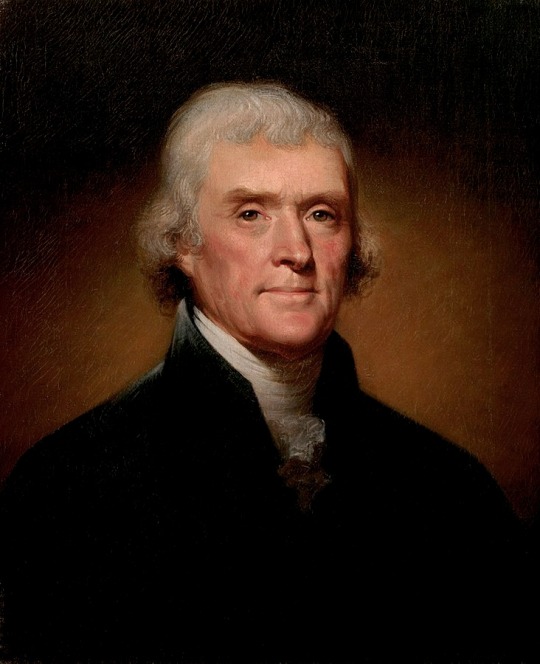
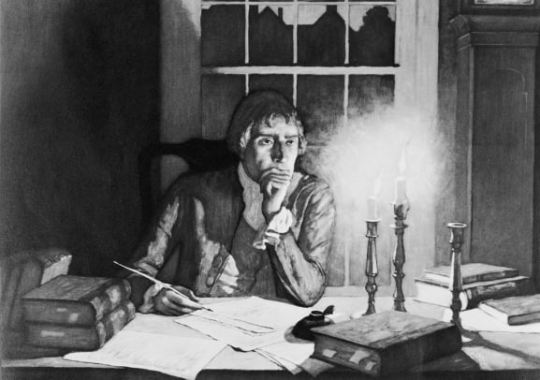
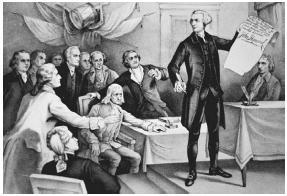
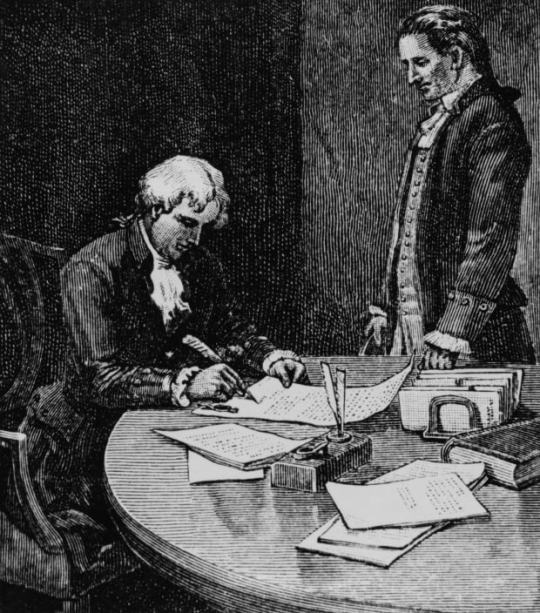
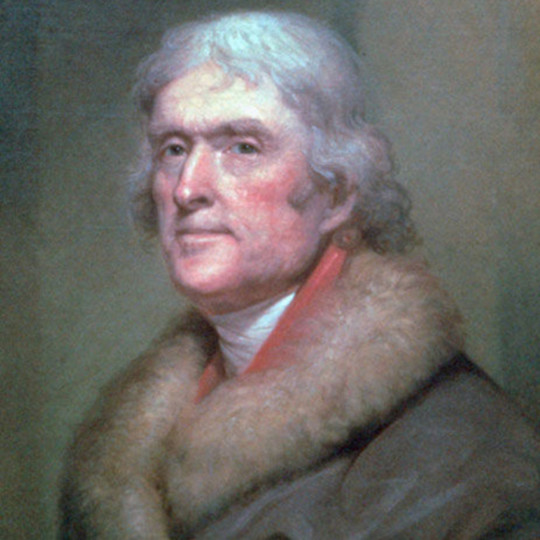
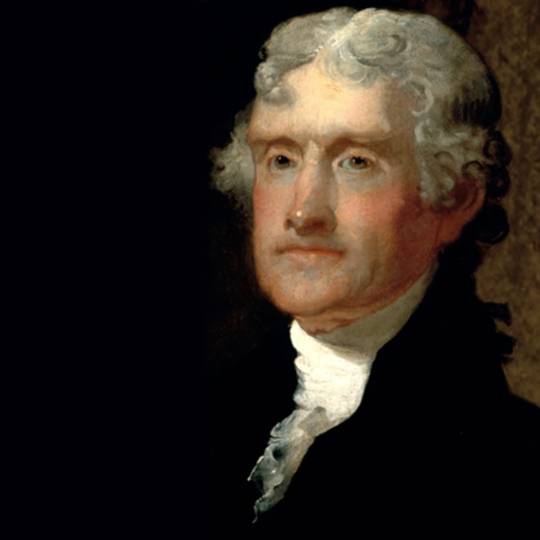
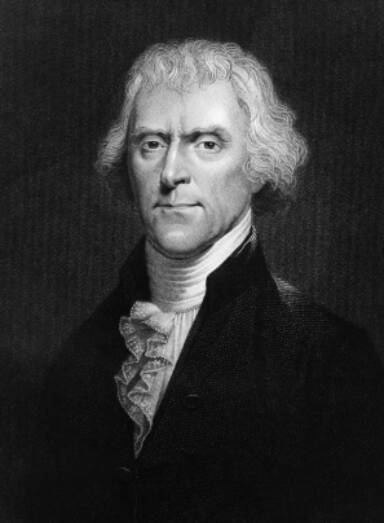
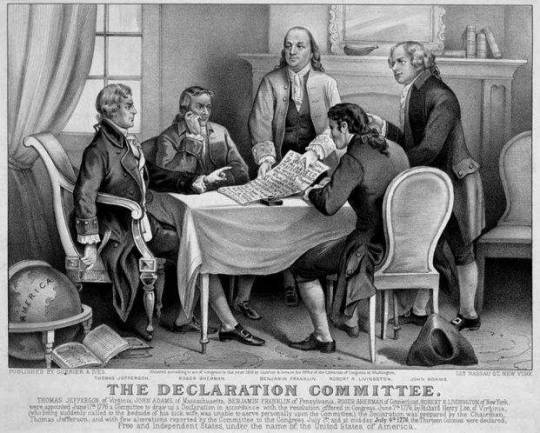
Arrivals & Departures
13 April 1743 – 04 July 1826
Thomas Jefferson
Thomas Jefferson was an American statesman, diplomat, lawyer, architect, philosopher, and Founding Father who served as the third president of the United States from 1801 to 1809. He had previously served as the second vice president of the United States under John Adams between 1797 and 1801. The principal author of the Declaration of Independence, Jefferson was a proponent of democracy, republicanism, and individual rights, motivating American colonists to break from the Kingdom of Great Britain and form a new nation; he produced formative documents and decisions at both the state and national levels.
During the American Revolution, Jefferson represented Virginia in the Continental Congress that adopted the Declaration of Independence. As a Virginia legislator, he drafted a state law for religious freedom. He served as the second Governor of Virginia from 1779 to 1781, during the American Revolutionary War. In 1785, Jefferson was appointed the United States Minister to France, and subsequently, the nation's first Secretary of State under President George Washington from 1790 to 1793. Jefferson and James Madison organized the Democratic-Republican Party to oppose the Federalist Party during the formation of the First Party System. With Madison, he anonymously wrote the provocative Kentucky and Virginia Resolutions in 1798 and 1799, which sought to strengthen states' rights by nullifying the federal Alien and Sedition Acts.
As president, Jefferson pursued the nation's shipping and trade interests against Barbary pirates and aggressive British trade policies. Starting in 1803, Jefferson promoted a western expansionist policy, organizing the Louisiana Purchase which doubled the nation's land area. To make room for settlement, Jefferson began a controversial process of Indian tribal removal from the newly acquired territory. As a result of peace negotiations with France, his administration reduced military forces. Jefferson was reelected in 1804. His second term was beset with difficulties at home, including the trial of former vice president Aaron Burr. In 1807, American foreign trade was diminished when Jefferson implemented the Embargo Act in response to British threats to U.S. shipping. The same year, Jefferson signed the Act Prohibiting Importation of Slaves.
Jefferson, while primarily a planter, lawyer and politician, mastered many disciplines, which ranged from surveying and mathematics to horticulture and mechanics. He was an architect in the classical tradition. Jefferson's keen interest in religion and philosophy led to his presidency of the American Philosophical Society; he shunned organized religion but was influenced by Christianity, Epicureanism, and deism. A philologist, Jefferson knew several languages. He was a prolific letter writer and corresponded with many prominent people, including Edward Carrington, John Taylor of Caroline and James Madison. Among his books is Notes on the State of Virginia (1785), considered perhaps the most important American book published before 1800. Jefferson championed the ideals, values, and teachings of the Enlightenment.
During his lifetime, Jefferson claimed ownership of over 600 slaves, who were kept in his household and on his plantations. Since Jefferson's time, controversy has revolved around his relationship with Sally Hemings, a mixed-race enslaved woman and his late wife's half-sister. According to DNA evidence from surviving descendants and oral history, Jefferson probably fathered at least six children with Hemings, including four that survived to adulthood. Evidence suggests that Jefferson started the relationship with Hemings when they were in Paris, where she arrived at the age of 14, when Jefferson was 44. By the time she returned to the United States at 16, she was pregnant.
After retiring from public office, Jefferson founded the University of Virginia. Jefferson and his colleague John Adams both died on Independence Day, July 4, 1826, the 50th anniversary of the adoption of the Declaration of Independence. Presidential scholars and historians generally praise Jefferson's public achievements, including his advocacy of religious freedom and tolerance in Virginia. Although some modern scholars have been critical of his stance on slavery, Jefferson continues to rank highly among the top ten U.S. presidents.
0 notes
Text
North Dakota Republicans Move to Wrest Control from Biden, Place Power Back with the Constitution
North Dakota Republicans Move to Wrest Control from Biden, Place Power Back with the Constitution
An old idea is new again in North Dakota as a barrage of executive orders flow from the Biden White House in 2021.
By Jack Davis
Published February 6, 2021 at 11:28am
As the federal government in 1798 teetered dangerously close to what James Madison considered a vast misuse of its powers under the Constitution, he authored the Virginia Resolution.
The resolution affirmed that “in case of a…
View On WordPress
0 notes
Photo
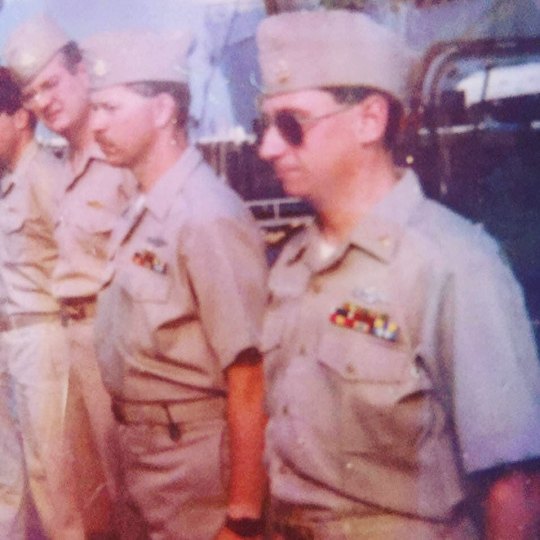
On 13 October 1775 a resolution of the Continental Congress established what is now the United States Navy with “a swift sailing vessel, to carry ten carriage guns, and a proportionable number of swivels, with eighty men, be fitted, with all possible despatch, for a cruise of three months...” After the American War of Independence, the U.S. Constitution empowered the new Congress “to provide and maintain a navy.” Acting on this authority, Congress established the Department of the Navy on 30 April 1798. In 1972, Chief of Naval Operations Admiral Zumwalt authorized official recognition of 13 October as the birthday of the U.S. Navy. #navy #navybirthday #usnavy #submarine (at Navy Base, Virginia) https://www.instagram.com/p/CGP592fjjUB/?igshid=17kiw6x43xms3
0 notes
Text
Thomas Jefferson was an American statesman, diplomat, lawyer, architect, philosopher, and Founding Father who served as the third president of the United States from 1801 to 1809. He had previously served as the second vice president of the United States between 1797 and 1801. Wikipedia Born: April 13, 1743, Shadwell, VA Deceased: July 4, 1826, Monticello, VA Presidential term: March 4, 1801 – March 4, 1809 Spouse: Martha Jefferson (m. 1772–1782) Children: Martha Jefferson Randolph, Madison Hemings, Eston Hemings, Vice presidents: Aaron Burr (1801–1805), George Clinton (1805–1809) be much to see why one of my Favorite may likeness in coincidence of likeness in the everything and nothing in everything and nothingness and as Philosopher yes Pythagorean numerology Jefferson was familiar with the practice but its sugar honey ice tea to them stuff to us like magic and stuff and Kauffman Hawkins like Tsu or Tzu cupid if its love you not stupid lacking in Lovingness or intelligence and well 5 cent 3rd President 2 Dollar bill letter two B And 3rd President C if so yes in God we trust in common day but Founded this was A Nation under God indivisible by all but whom if so like my initial the TH in Thomas after every 3rd and TH as high as numbers go past 4th like seals 7 or G Tao or Dao the way or the path maybe numerological science and study of numerology a love without apology or other things to say be it Theory Lesson plans Literature Educational the Her in Philosopher and his and hers or him and her like he and she not Shi like Delta four D not Hotels but this one coming along well During the American Revolution, he represented Virginia in the Continental Congress that adopted the Declaration, drafted the law for religious freedom as a Virginia legislator, and served as the second Governor of Virginia from 1779 to 1781, during the American Revolutionary War. He became the United States Minister to France in May 1785, and subsequently, the nation's first secretary of state under President George Washington from 1790 to 1793. Jefferson and James Madison organized the Democratic-Republican Party to oppose the Federalist Party during the formation of the First Party System. With Madison, he anonymously wrote the provocative Kentucky and Virginia Resolutions in 1798 and 1799, which sought to strengthen states' rights by nullifying the federal Alien and Sedition Acts.As president, Jefferson pursued the nation's shipping and trade interests against Barbary pirates and aggressive British trade policies. Starting in 1803, Jefferson promoted a western expansionist policy, organizing the Louisiana Purchase, doubling the nation's land area. To make room for settlement, Jefferson began a controversial process of Indian tribal removal from the newly acquired territory. As a result of peace negotiations with France, his administration reduced military forces. Jefferson was reelected in 1804.
Hawkins Versus 2/of
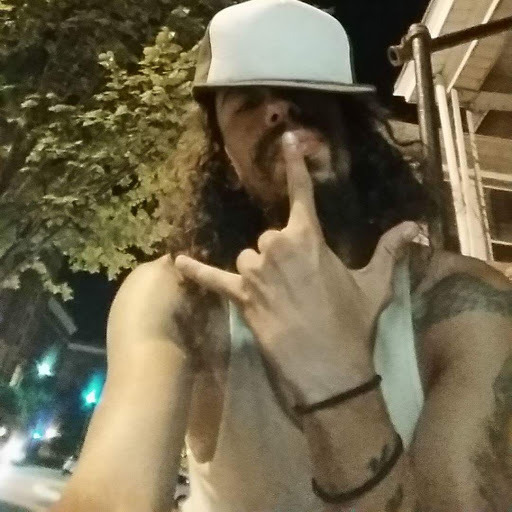
0 notes